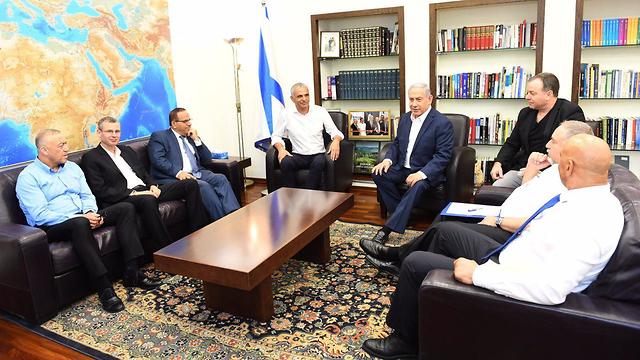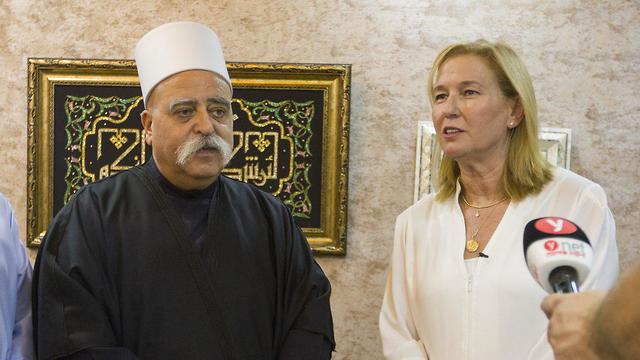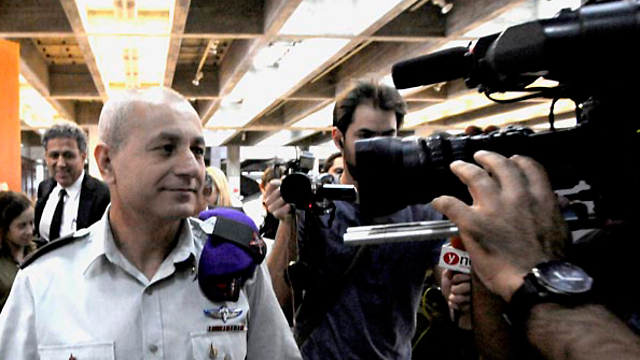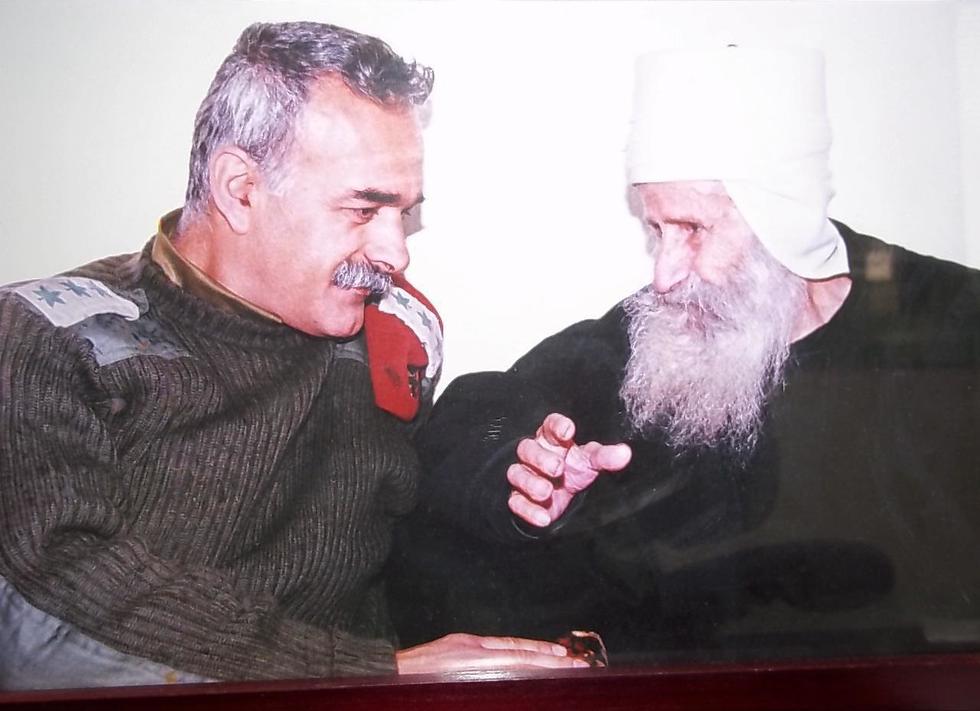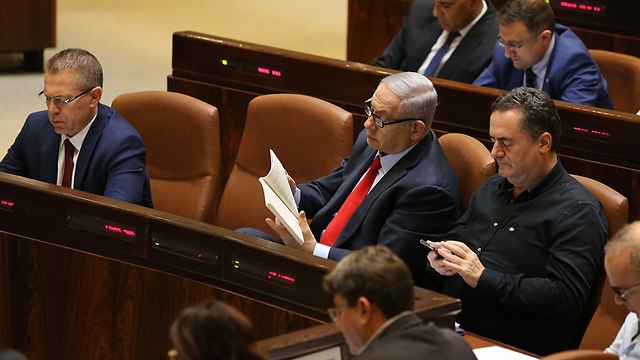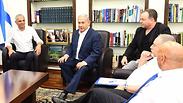

Netanyahu discusses 'Druze needs' over Nationality Law protest
PM meets with Ministers Lieberman, Kahlon and Kara and MKs Amar and Hasson ahead of meeting with Druze community leaders following their protest against the Nationality Law; Druze leader says happy to accept meeting, so long as it focuses on amending Nationality Law.
Prime Minister Benjamin Netanyahu held a meeting with government ministers and Knesset members Thursday about the needs of the Druze community ahead of his meeting Friday with Druze leaders in the wake of their protest over the Nationality Law.
The prime minister met with Defense Minister Avigdor Lieberman, Finance Minister Moshe Kahlon, Communications Minister Ayoob Kara, and MKs Hamad Amar (Yisrael Beytenu) and Akram Hasson (Kulanu) at the Kirya IDF headquarters in Tel Aviv, holding what was described as a cordial and positive discussions.
Despite this, no agreements have been made regarding changes to the Nationality Law, according to the Prime Minister's Office. Netanyahu and Minister Yariv Levin, who led the legislation process, don't think it's right to "open" the law at this time and make changes to it.
Despite the PMO's statement, MK Hasson said the prime minister did promise to examine the legal aspects of amending the last, tasking Minister Levin with it.
The prime minister will meet on Friday with the Druze community's dignitaries, including spiritual leader Sheikh Mowafak Tarif.
Tarif said he was happy to accept the prime minister's invitation to meet, as long as the meeting will focus on amending the Nationality Law.
"We are not talking about other problems right now, like the budget. We want to know the Druze's status under the Nationality Law and understand how the law's definition of the Druze's status and rights will affect the community. This is our current concern. This, and nothing more," he said.
The Sheikh will address the Jewish Agency's Board of Governors meeting on October 24 in Tel Aviv after accepting the invitation of new Jewish Agency chairman and outgoing opposition leader Isaac Herzog, made as a sign of respect and appreciation for the Druze community in the wake of the Druze's protest against the Nationality Law.
On Sunday, coalition party leaders will discuss the matter in an effort to formulate a plan to help resolve the real issues facing the Druze community in Israel.
In addition, the government will consider promoting legislation to give preference to Druze who serve or served in the IDF.
During Thursday's meeting, Netanyahu and the other officials discussed the possibility of adding to a law passed in May that sets a day in the State of Israel's official national calendar celebrating the Druze community and their contribution to the country.
Alternatively, the coalition could propose new legislation to establish the Druze community's status in the State of Israel.
"Netanyahu is once again lying to the public. This is his how he operates— he supports the protest in order to bury it," accused Zionist Union MK Saleh Saed.
"I stopped believing the Prime Minister's Office's political spins, I will continue to protest against the Nationality Law with all my might, alongside bereaved families and the entire Druze community," he concluded.
Education Minister Naftali Bennett on Wednesday criticized the law that he and his party members voted for.
"Following conversations with many of our Druze brothers, it appears that the way we passed the Nationality Law was detrimental to the Druze community and to those who link their fate with the Jewish state," Bennett wrote in his Twitter account.
"This, of course, is not the intention of the Israeli government. These are our blood brothers who made a covenant with us, and stand with us, shoulder to shoulder, on the battlefield. We, the Government of Israel, have a responsibility to find a way to bridge the gap," Bennett stated.
Netanyahu put all of his weight behind the Nationality Law, which states that the State of Israel is the nation-state of the Jewish people and that Hebrew is the official language of the state. Arabic was defined as having a special status, with the official state use of Arabic to be determined in separate legislation.
Under the previous version of the bill, which passed in its first reading in May, the Arabic language was to receive a special status and state services were to be made accessible in Arabic as well.
This week, 100 Druze IDF officers in reserves, many of them with a rich record of fighting in Israel's various wars over the years, have joined the fight against the law.
Several of the Druze reserve officers expressed anger for being excluded from Israeli society despite the fact they served and continue to serve the country.
"I don't understand why this law is necessary. Is somebody questioning that the fact the country is Jewish? This law only creates second-class citizens," Brig. Gen. (res.) Imad Fares lamented.
One of the main sticking points of the law was article 7b, which defined the development of the Jewish settlements as a national value, and allowed the exclusion of people from these new communities on the basis of race or religious, among other things.
However, after a warning from the Knesset's legal advisor, the article was amended. The law in its new version states that Israel "views the development of Jewish settlements as a national value and will act to encourage and promote its establishment."
The first petition to the High Court of Justice against the Nationality Law was submitted last week by the heads of the Druze community, followed by three Knesset members—including two from the coalition—who also filed a petition to the High Court on Sunday.
The move was initiated by MKs Amar (Yisrael Beytenu), Hasson (Kulanu) and Saed (Zionist Union).
The Druze community's petition, which was submitted in bilateral move, was formulated by the Druze Lawyers' Forum on behalf of the Knesset members, the Forum of Druze Community Leaders and the Druze community.
"For the Druze community, which sacrifices its blood and its sons for the sake of Israel, the Nationality Law is a spit in the face," said the MKs.
"We have joined forces in a bilateral move because this is an extreme governmental action against Arabic speakers. The law perpetuates the discrimination against the Druze community and other minority groups," added the Druze MKs.
 |














